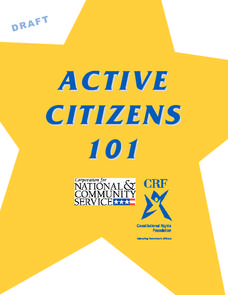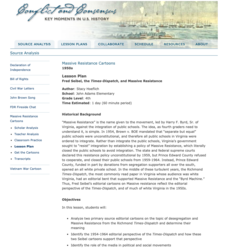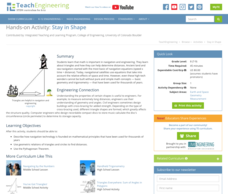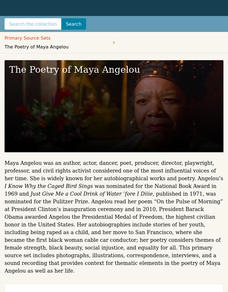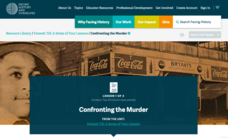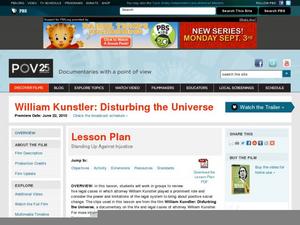National Endowment for the Humanities
Slavery and the American Founding: The "Inconsistency Not to Be Excused"
High schoolers examine slavery in the revolutionary and colonial eras of the United States. In this slavery lesson, students investigate the presence of slavery in early America, the language of the Constitution, and the intent of the...
Curated OER
Active Citizens 101
Students explore and investigate multiple aspects of citizenship and democracy in a sequence of lessons that involve thoughtful discussin and participation to assist in gaining a better perspective of what citizenship and domocracy is,...
Anti-Defamation League
Shirley Chisholm: Unbought, Unbossed and Unforgotten
A 13-page packet introduces high schoolers to a lady of amazing firsts. Shirley Chisholm was the first Black woman elected to Congress, the first Black woman to run for President of the United States, and a leader of the Women's Rights...
Mississippi Whole School Initiative
Dream Big...With Your Eyes Wide Open
For many people, Barack Obama's presidency was the next step in Martin Luther King, Jr's dream of America's future. Explore the dreams of Americans past and present, as well as the young Americans in your class, with a set of activities...
Roy Rosenzweig Center for History and New Media
Fred Seibel, the Times-Dispatch, and Massive Resistance
A lesson plan challenges scholars to analyze editorial cartoons created by Fred Seibel, illustrator for the Times-Dispatch, during the Massive Resistance. A class discussion looking at today's editorial pages and Jim Crow Laws leads the...
Center for History Education
Speaking Up and Speaking Out: Exploring the Lives of Black Women During the 19th Century
Young historians investigate the often-hidden history of free and enslaved African American women before the Civil War. Using a collection of primary and secondary sources, including speeches, diaries, and poems, they evaluate the often...
California Education Partners
Letter From Birmingham Jail
To demonstrate their ability to comprehend complex text, ninth graders are asked to craft an essay in which they use evidence drawn from "Letter From Birmingham Jail" to analyze how Martin Luther King, Jr. uses rhetorical devices such as...
Teach Engineering
Stay in Shape
Using their knowledge of right triangles, pupils find out how far a ship is from a light house. Class members determine how far around the world a ship would be sailing at a constant speed.
K12 Reader
African American Freedom Fighters Word Search
An informative word search includes the names of six famous African American civil rights leaders. The list includes Rosa Parks, Sojourner Truth, Martin Luther King, Jr., Harriet Tubman, and Frederick Douglass.
DocsTeach
Women of Color and the Fight for Women's Suffrage
Introduce young historians to primary source analysis with a lesson that teaches them how to use a four-step process to analyze a photograph of a 1913 Suffrage Parade. Groups practice the process and share their observations with the...
Orlando Shakes
The Best of Enemies
History comes to life with the play The Best of Enemie. Scholars learn literary elements as well explore racial issues in American history. The play is based on a true story and addresses the universal truth that people are capable of...
Digital Public Library of America
The Poetry of Maya Angelou
Maya Angelou's work reflects her passion for life, civil rights, and justice for all. A collection of 12 primary sources provide scholars with insight into this amazing woman. The set includes photographs, articles, recordings of...
Curated OER
The Opinions Of The Public
Tenth graders discuss the importance of America's constitutional right to free speech, the difficulty of dealing with public opinion as an elected official and identify the importance of public discussion and the election process.
Curated OER
Making Democracy Work for Everyone, 1877-1904
Students investigate the culture of the post Reconstruction South. They participate in a jigsaw research activity, conduct Internet research on an assigned topic, and write a report to present to the class.
PBS
The March on Washington and Its Impact
High schoolers read Martin Luther King, Jr's speech that he gave in Washington. They identify the social conditions that led to the civil rights movement. They discuss the significance of the March on Washington.
Facing History and Ourselves
Emmett Till: Confronting the Murder
The 1955 murder of Emmett Till is often regarded as the catalyst for the Civil Rights Movement of the 20th century. Learn more about the brutal crime—and, as many believe, the miscarriage of justice—that began a national conversation...
Curated OER
The Life of Harriet Tubman
A well-designed lesson teaches about the history of Harriet Tubman, the Underground Railroad, and the issues of civil liberties. Young historians watch a video, access Internet resources, and engage in cooperative activities which should...
PBS
Standing Up Against Injustice
“Sometimes things are lawful yet are actually wrong.” Researchers examine primary and secondary source materials as they study five legal cases involving civil rights attorney William Kunstler in which he attempted to use the legal...
PBS
Baseball: The Tenth Inning
Bring the historical relevance of baseball into the classroom, as pupils discover the lessons learned from the breaking of baseball's color barrier by Jackie Robinson. Learners view video and analyze Robinson’s character, as well as his...
Curated OER
Social Activism In The United States
Middle schoolers explore justice issues. In this social activism lesson, students watch "Social Activism in the United States," and then locate newspaper articles from the 1960's and 1970's about events during the era.
Curated OER
How Music Motivates
Young scholars form conclusions regarding the motivational effects of music on the mind during the Civil Rights era. In this Civil Rights movement lesson, students describe how music motivates, describe the motivational role in freedom...
Smithsonian Institution
Resistance to School Desegregation: The Boston Busing Crisis
Despite how it sounds, Boston's busing crisis wasn't a transportation problem. Academics address the problems faced by African Americans following school desegregation and the struggle to receive equal educational opportunities. Scholars...
National Woman's History Museum
Dolores Huerta: The Life and Work of a 20th Century Activist
Extra! Extra! High schoolers read about Dolores Huerta, the social activist who helped organize the United Farm Workers. Researchers read primary and secondary sources about Huerta's work and craft a headline, supported by three pieces...
Center for History and New Media
The Impact of the Jim Crow Era on Education, 1877–1930s
Even though American slaves were officially emancipated in 1865, the effects of slavery perpetuated throughout the 19th and 20th centuries. Middle and high schoolers learn about the ways that discrimination and the Jim Crow laws...



